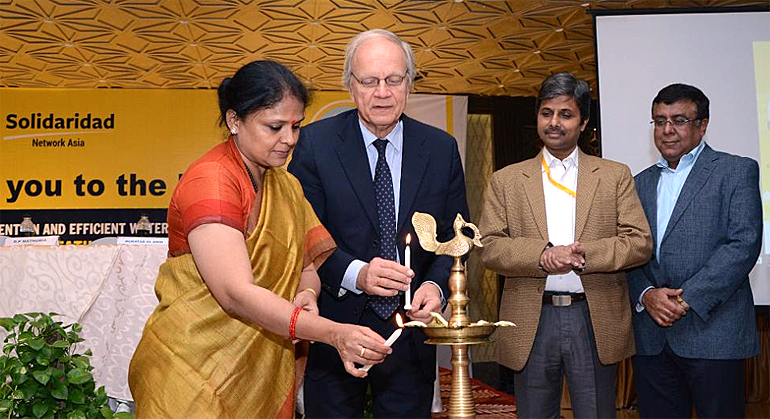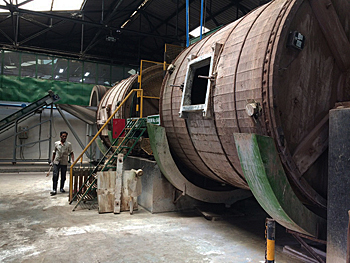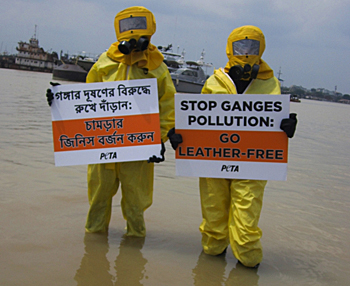Dutch-Indian partnership introduces less polluting tanning technology for cleaner Ganges, India
 Three Dutch organisations, together with a number of Indian partners, launched a partnership to introduce a new, more environmental friendly, production process for the leather industry in India.
Three Dutch organisations, together with a number of Indian partners, launched a partnership to introduce a new, more environmental friendly, production process for the leather industry in India.
The aim of the partnership is to reduce the effluent water discharged by at least 40 percent, contributing to a cleaner Ganges river. The three Dutch organisations are non-governmental organisation Solidaridad, leather processing product supplier Stahl and senior experts organisation PUM. The five-year project was launched in Kanpur on 13 November (see top photo).
 The aim is to reduce the effluent water discharge of the tanneries in Kanpur with 40 percent.
The aim is to reduce the effluent water discharge of the tanneries in Kanpur with 40 percent.
Overall water use
The project seeks to make the Kanpur Leather Cluster more sustainable by implementing new working methods and state-of-the-art technologies with a lower environmental impact.
It will address the overall water use and pollution from the Kanpur leather cluster, which is partly responsible for pollution loads in the Ganges.
Stahl will be established to demonstrate more sustainable technologies. In addition, there are activities for downstream communities about efficient water use for irrigation and livestock farming.
More sustainable tanneries
‘Solidaridad sees cooperation with tanneries and governments as the key to a cleaner Ganges’, says Gert van der Bijl, International Programme Manager Livestock & Leather at Solidaridad.
 Protests against pollution of the Ganges river, made the Indian governement to start the Clean Ganga project.
Protests against pollution of the Ganges river, made the Indian governement to start the Clean Ganga project.
‘Together we work on sustainable work practices for these tanneries. Solidaridad will introduce new technologies, business processes and trainings at all levels to diminish water use and pollution. Improving working conditions is an important focus’, Van der Bijl adds.
Complex water issues
According to Stahl the Kanpur leather cluster faces complex water issues. ‘Some 400 tanneries discharge 50 million liters of waste water each day’, explains Michael Costello, Director Sustainability at Stahl.
‘We alone cannot change the situation, so we have joined forces with industry partners and local authorities to contribute to the clean-up already underway of this iconic and sacred river,” says Costello.
The project is supported by The Sustainable Water Fund programme (FDW), a public-private partnership facility of the Dutch Ministry of Foreign Affairs.
This news item was originally published on the websites of Solidaridad, Stahl and PUM.
Read also on this website
● Indian-Dutch consortium rolls out cleaning project Barapulla drainage canal, New Delhi, India, 21 September 2016
● Aqua-Aero Watersystems delivers RO treated groundwater for 0,47 eurocent in Gujarat India, 18 January 2015
● Country: India
● Expertise: Water technology
More information
Solidaridad
Utrecht, the Netherlands
+31 30 275 9450
www.solidaridadnetwork.org
Stahl
Waalwijk, the Netherlands
+31 416 689 189
www.stahl.com
PUM Netherlands senior experts
The Hague, the Netherlands
+31 70 349 05 55
www.pum.nl



